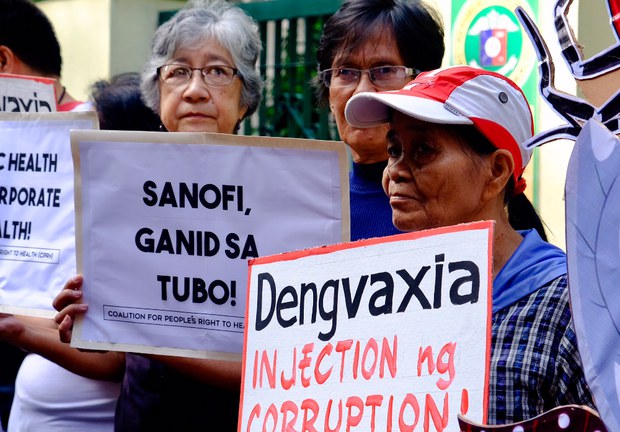Philippines Demands Full Refund for Dengue Vaccine
2017.12.08
Cagayan de Oro, Philippines, and Manila
 Philippine activists from the Coalition for People’s Right to Health protest outside the Department of Health in Manila, Dec. 8, 2017.
Philippine activists from the Coalition for People’s Right to Health protest outside the Department of Health in Manila, Dec. 8, 2017.
The Philippine government said Friday it would demand full reimbursement for billions of pesos paid to French firm Sanofi Pasteur for what was touted as a breakthrough anti-dengue vaccine.
The government stopped short of saying it would take the pharmaceutical giant to court amid a public health controversy. It has seen panicked parents demanding quick answers after Philippine health officials last week suspended a school-based dengue immunization program using Dengvaxia, a vaccine developed by Sanofi.
“We will demand the refund of the 3.5 billion pesos (U.S. $69.35 million) paid for the Dengvaxia, and that Sanofi set up an indemnification fund to cover the hospitalization and medical treatment for all children who might have severe dengue,” Health Secretary Francisco Duque said.
He said the state-run Philippine Health Insurance Corp. was ready to step in and cover the expenses of any of the children already vaccinated by Dengvaxia and who are showing signs of “severe dengue” infection. More than 740,000 Filipino schoolchildren were vaccinated with the drug.
“We will continue to be vigilant in monitoring our children for any adverse event following immunization, and will strengthen the readiness of our public hospitals in attending to any severe dengue cases that may occur,” Duque stressed.
Task force
The health department has formed a special task force to track developments related to government’s immunization program that began last year, the first time Dengvaxia was used in Asia in what was then considered a breakthrough of sorts.
The task force is to monitor and attend to the health concerns of those already immunized, Duque said.
It would “conduct a thorough review of the dengue vaccination initiative’ in the wake of Sanofi’s announcement last week that Dengvaxia could trigger adverse side effects to people who have not had dengue but were given the drug.
Following the announcement, the government pulled the drug off shelves and established an investigation to determine the circumstances that allowed Sanofi to launch the drug here.
Duque said the task force would include top officials from the health department’s central office and physicians in areas where Dengvaxia was released. Officers are to be deployed in hospitals in the affected areas.
“We will be deploying them immediately for active surveillance and data collection in these hospitals. Surveillance will be done for five years,” Duque said. “This is part of our commitment to the parents and children who were immunized with the anti-dengue vaccines.”
A legal team from the task force is to examine Sanofi Pasteur’s accountability. The company has insisted that its drug is safe, but needed to change its warning label.
Last week, the company announced that tests confirmed that the vaccine could cause severe side effects for anyone receiving it that had no prior dengue infection.
Still, Sanofi has insisted on the effectiveness of its drug and said that it did not “contain any viruses that can make people ill with dengue or severe dengue.”
Manila launched its anti-dengue program last year and the first of three doses was given to children age 9 and older in regions where the health department had recorded the largest outbreak of dengue cases.
The disease infects about 200,000 Filipinos every year and it is common in populated urban areas and slums where mosquitoes breed.







